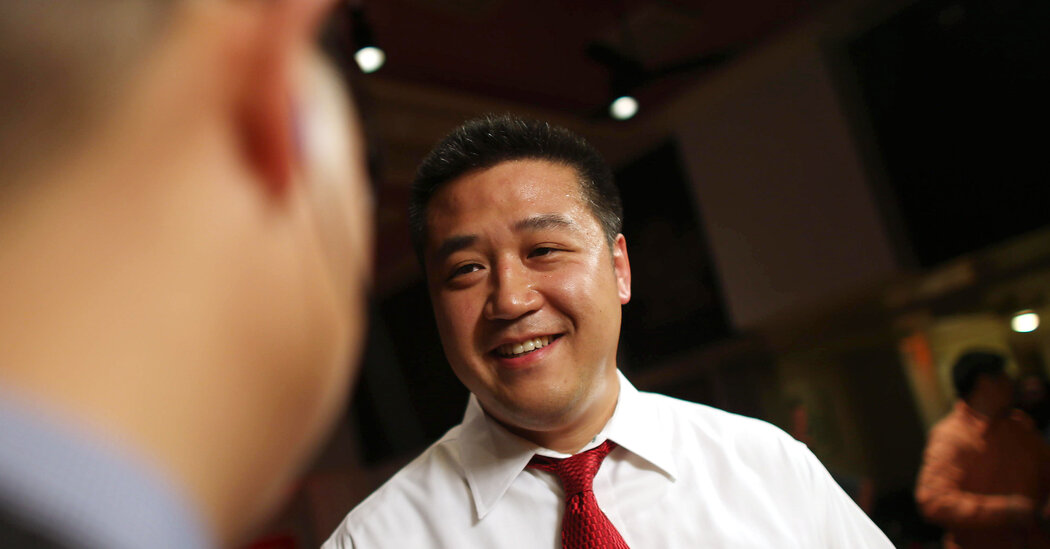A member of Canada’s Parliament testified on Tuesday that high school students from China were transported by bus to vote for him in a party election that is at the center of a federal inquiry into interference in Canadian elections by China and other foreign countries.
Testifying during a public hearing in Ottawa, the Parliament member, Han Dong, a Chinese-Canadian politician formerly from Prime Minister Justin Trudeau’s Liberal Party, said that he had met and sought the support of the students from a private high school in 2019, but that he did not know who had chartered or paid for the bus on the day of the election.
A Canadian intelligence report disclosed during the hearing said there were indications that a “known proxy agent” of the Chinese Consulate had provided the students “with falsified documents to allow them to vote” even though they did not reside in Mr. Dong’s electoral district.
Noncitizens over the age of 14 can register and vote in party elections as long as they show proof they live in an electoral district.
According to the report, there were also indications that the Chinese Consulate had coerced the students to back Mr. Dong by issuing “veiled threats” related to their visas and their families back in China.
The Chinese Embassy has consistently denied interfering in Canadian politics.
Mr. Dong’s testimony was part of an ongoing federal inquiry into foreign meddling in Canada’s political system, especially the general elections of 2019 and 2021. The inquiry was called after a series of intelligence leaks to the Canadian news media indicated that the Chinese government had interfered in both elections by supporting candidates favorable to its policies and by undermining its critics.
The public hearing on Tuesday before a commission appointed by Mr. Trudeau featured for the first time political officials directly involved in the 2019 and 2021 elections.
Mr. Dong denied receiving help from the Chinese government during his campaign for Parliament in Canada’s 2019 general elections. Asked whether he believed that the Chinese government has interfered in Canadian politics, Mr. Dong said, “I’ve never seen any evidence of it.” When pressed, he added, “It’s possible.’’
In recent years, Canadian intelligence officials have issued public warnings about China’s intensifying efforts to sway votes in the populous suburbs of Toronto and Vancouver, which are home to Canada’s biggest Chinese diasporas.
Under President Xi Jinping’s aggressive foreign policy, China has tapped into its diasporas worldwide to try to influence local politics, according to intelligence officials, academics and diaspora members. Other nations like Australia have tried to curb China’s influence, including by establishing a registry of foreign agents.
Canada under the government of Mr. Trudeau — whose Liberal Party candidates were generally favored by China, according to Canadian news media — has long faced criticism for not doing enough to combat foreign meddling.
Mr. Trudeau steadfastly opposed a public inquiry into the topic, but, facing increasing attacks by the opposition and leaks to the news media, agreed to one in September.
On Tuesday, the Liberal national campaign director in 2021, Azam Ishmael, testified that the issue of foreign interference had been “low on the radar” in 2021.
But much of Tuesday was spent on Mr. Dong’s 2019 party election in his electoral district in Toronto, Don Valley North, before that year’s general election.
The outcome of the party race was significant because the district was a Liberal stronghold and the winner was almost certain to become its member of Parliament.
The party election in that district became a focus of the inquiry after Canadian news media, citing intelligence leaks, reported that Mr. Dong had received the help of the Chinese Consulate in Toronto.
A government-appointed special rapporteur said last year that the party election had been marked by “irregularities,” including “busing in of people and students,” and that there was “well-grounded suspicion” that Mr. Dong had benefited from the consulate’s support.
In an interview with federal inquiry officials in February, Mr. Dong did not mention the students who had been bused in. He acknowledged the fact for the first time in a written submission to inquiry officials on Monday, a day before his testimony. He did so, he said, after his wife “reminded” him of it.
Political scientists have said that the party nomination process of the Liberals and other parties was susceptible to foreign manipulation.
But Mr. Ishmael, the Liberal campaign director, said the party nomination process was “rigorous,” adding that he did not believe it was “vulnerable to foreign interference.”
On Tuesday, a lawyer representing an opposition lawmaker noted that even foreign students on “a one-year study program” could vote in a party election.
And a lawyer for a human rights organization pointed out during Tuesday’s hearing that authoritarian governments can coerce foreign students or diaspora members to vote in a certain way through various means, including monitoring cellphones and social media.
Would this fear “make members of diaspora communities vulnerable to coercion in a nomination race?” the lawyer asked Mr. Ishmael.
Mr. Ishmael said he had not thought about that “in depth” but added, “I would think so, yes.”
The inquiry commission, which is led by Marie-Josée Hogue, a Superior Court justice from Quebec, is required to issue a preliminary report in May and a final one in December.
The Chinese government leads other nations in interfering in Canadian politics, according to an intelligence briefing disclosed during the hearings. But worries over meddling widened last year, when Mr. Trudeau accused Indian government agents of killing a Canadian Sikh leader in Vancouver.


